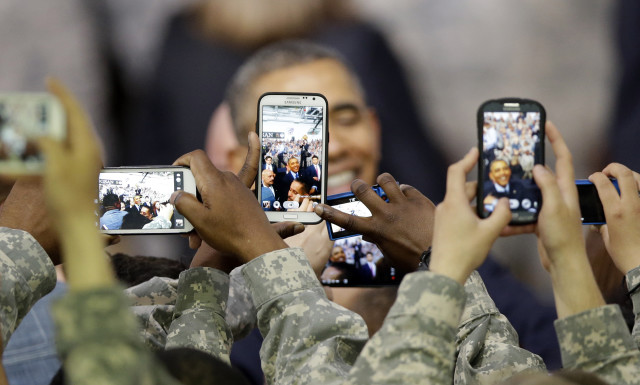
US soldiers use their smartphones to take pictures of US President Barack Obama after he delivered a speech at the US military base Yongsan Garrison in Seoul, South Korea, April 26, 2014. (Reuters)
Digital devices have become where we keep many of the vital pieces of our lives – snapshots once relegated to photo albums, contact information that used to be committed to memory or recorded in address books, even sensitive records kept in filing cabinets. All it takes is one careless moment for all those digitally-stored ‘memories’ to be lost forever.
“We use our devices … to remember things like where did we park our car in the parking lot or what’s the password for that account?” said Chris Doggett, Managing Director of Kaspersky Lab North America in an interview. “We take pictures with them and use them really to store all sorts of information that we frankly don’t want to try to remember because it’s tough to remember. And it works really well for that.”
It is virtually impossible to remember every little detail; and a recent Kaspersky Lab study found that people increasingly entrust personal information to their mobile devices.
The study, The Rise and Impact of Digital Amnesia, found that up to 53 percent of Europeans surveyed could not remember their children’s telephone number. About 51 percent had to look up the office number, and a third couldn’t remember their partners’ numbers.
In the U.S., 90 percent of those polled said they use their mobile devices and the Internet as an online extension of their brain. About half of those – around 44 percent – said they use their digital device as short-term memory.
At times, people don’t even bother to remember things they assume they can find online. According to the survey, up to 36 percent of Europeans polled were more likely to search the Internet than try to remember the information they need.
Howard Eichenbaum, Director of Boston University’s Center for Memory & Brain told TECHtonics he is concerned that people might “not build a body of knowledge composed by integrating new facts into an organization of knowledge or ‘schema.’”
“The Web has such an amazing body of facts and knowledge at our fingertips,” he said. “It is amazingly useful and extends us in ways few of us could imagine doing without them. On the other hand … I worry that the poverty of ‘knowledge’ personally gained by having to work through memories to incorporate them into knowledge compromises our mental agility in solving new problems.”
He recalled that, growing up, he had to work though routes on a paper map, for example, as part of building in his head an overall layout of the city where he lived. But today, with apps like Google Maps, which give directions to every turn a driver needs to take, Eichenbaum worries “that kids never work with, build, or add to a map and so do not build ‘knowledge’ of their city.”
The information smartphones hold might be sufficient while the batteries last. The “downside to depending on these devices,” said Eichenbaum, “is that they do get lost, broken, or run out of juice more often than we should risk.”
Loss of information in those cases is due to “an extreme fault of the users,” he said, because “everyone should know to back up valuable information.”
On average, Doggett said people assume their information will always be available on their device, just as in their brain. But when the device is lost or the information is compromised, panic ensues.
“All of a sudden we lose what we’re relying on, which is …. its being readily accessible and its being private to us,” said Doggett.
The lost data might include passwords for dozens of accounts that a lot of people too commonly save to their devices so that they are readily available – a bad idea, said Doggett, given that less than one-in-three people surveyed – about 30 percent – added extra security features to their digital devices.
About 28 percent don’t even bother to add any security protection, which means that they will lose all their precious memories should their smartphone get lost, damaged or worse, stolen.
If the information is backed up on a home computer or on a cloud service or somewhere else – then some of it can be restored. Ideally, it should be backed up in multiple locations.
“A lot of the media out there is not going to last that long,” cautioned Doggett. “And cloud services may be reliable or may not be, depending on which ones you use and whether it is a free account today and you have to pay for it tomorrow. … If they don’t take some simple steps to ensure that it is available, it may not be available to them tomorrow.”
There is no denying the convenience of mobile devices. But Doggett said people tend to trust in technology a little too much.
“We are assuming security that doesn’t exist. … That’s the bad news,” he said. “The good news is that there are plenty of tools out there to address that problem; and a lot of them are free.”
Technology allows people to offload low-value information and use their brains for other tasks. “That’s technology helping us,” said Doggett. “We just need to do it in a way that’s safe” to avoid having its power turned against us.
He said digital amnesia by itself is not a bad thing as long as the devices are accessible and reliable. But they are only reliable if people “wake up” and take a few basic steps to protect their treasure trove of memories.
